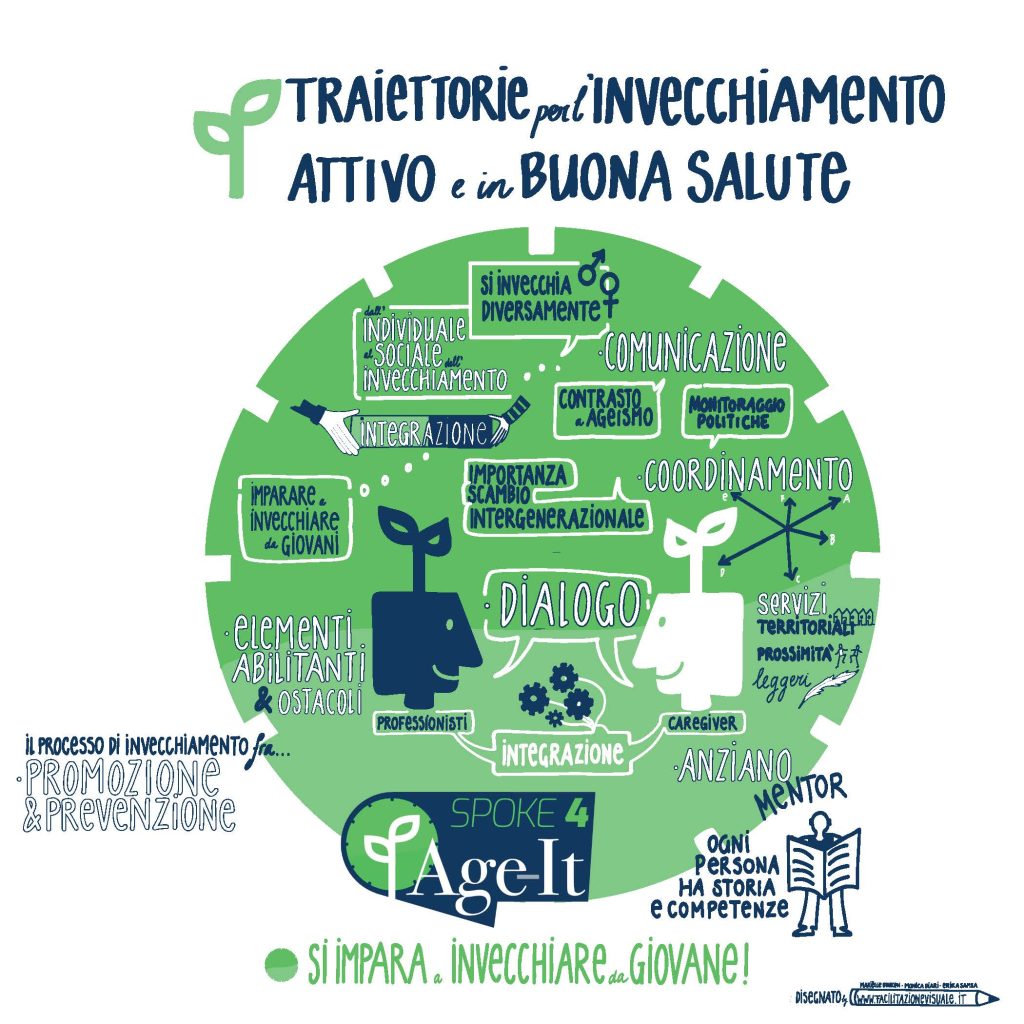
Traiettorie per l’invecchiamento attivo e in buona salute
Leader: Guido Iaccarino, UNINA
Co-Leader: Giovanna Boccuzzo, UNIPD
Affiliati: UNIMOL, SAPIENZA, UNICATT, SISSA, GENERALI
Spoke Themes
This challenge addresses age-related changes in cognition, emotions, behaviours and physiological functioning as people progress through older ages. Spoke 4 will develop and implement innovative interventions targeting specific physical ageing processes and risk factors for diseases and their progression. This Spoke will follow a person-centred perspective that focus on multidimensional approaches to health in the physical, cognitive, behavioural and social domains.
Structure
Lo Spoke è progettato per sviluppare approcci e interventi innovativi e multidimensionali per promuovere un invecchiamento attivo e sano. L’obiettivo è creare una nuova generazione di personale non medico formato che condivida una cultura comune per l’Assistenza Attiva e Salutare. Le attività saranno implementate a partire dalla definizione dei casi d’uso e degli scenari. La conoscenza dei processi dell’invecchiamento fisiologico e dei fattori di rischio per le malattie e il loro progresso verrà coerentemente trasferita agli interventi.
Disciplines
Medicina Interna, Dermatologia, Chirurgia, Scienze Sociali, Demografia, Psicologia, Endocrinologia, Biologia, Attività Fisica ed Esercizio, Ortopedia, Neuropsicologia, Farmacia, Architettura, Sanità Pubblica, Matematica, Tecnologie Digitali.

Work Packages
Prof. Guido Iaccarino, UNINA
WP1 will address health promotion and disease prevention intervention to support the improvement of nutritional and physical activity habits during the life course (e.g., personalized counselling, digital literacy) for new anti-ageing strategies. Innovative approaches in the social and psychological domains (including re-training of professionals working in the NHS) will be piloted and tested to improve individual and collective well-being for citizens with different complexity of needs, e.g., chronic/multimorbidity patients.
Prof. Antonio Paoli, UNIPD
WP2 will provide specific motivational tools and cognitive exercises to strengthen the brain-body connection. Ageing is a complex process that modifies human body response to exercise and nutrition. Belief and attitudes toward ageing may affect cognitive and psychological function; hence, exercise and nutrition must be tailored on individual needs and health status in older adults through easy-to-use, friendly smart devices/app that should record physiological conditions and adapt exercise and nutrition suggestions to the preferred daily changes.
Prof. Maddalena Illario, UNINA
WP3 aims to design effective interventions to improve physiological outcomes and diseases-related conditions in middle-aged and older adults through specific exercise, nutrition and psychological approach. This WP aims to: 1) investigate environments for active and healthy ageing; 2) address multidimensional approaches to falls prevention; 3) explore secondary use of data for targeted interventions on specific health domains; 4) explore health literacy and dissemination for healthy lifestyles targeting communities and the general population; 5) design, test and validate innovative and personalized training programs based on functional evaluation; 6) address mechanisms underpinning successful ageing in in vitro and in vivo models – i.e., early prevention of ageing.
Prof. Fabio Lucidi, SAPIENZA
WP4 aims, in a bio-psycho-social perspective, to identify and act effective and innovative strategies to promote mental health and well-being in later life minimising the cost of care and improving quality of life. The tasks within the WP will explore the potential of Virtual Reality and the role of natural environment for promotion of mental health among older people. Specific dimensions related to sexual and gender minority will be addressed.
Prof. Giovanna Boccuzzo, UNIPD
WP5 will develop analyses, models, and tools for the identification of vulnerable and at risk of frailty persons in the various stages of life, as well as studies on the causal pathways that generate unhealthy ageing. The analysis will consider the role of individual (e.g., socioeconomic status, formal and informal support) and contextual (e.g., social environments, social cohesion) factors on healthy and unhealthy ageing. Data science approaches to longitudinal databases will be used, boosted with ad hoc qualitative and quantitative surveys.
Prof. Francesco Pagnini, UNICATT
WP6 will develop innovative (technology-based) strategies to promote quality of life in old age, in close collaboration with Spoke 9. It will investigate and support psychosocial components that are highly relevant to healthy ageing but have been outlooked by the scientific literature. WP6 will focus on the role of personal engagement in the self-management of older adults and their families and communities, also supported by original technological solutions. The mindful promotion of ageing stereotypes is expected to lead to improved psychological and physical outcomes.
Key Outputs
Metodologie per lo studio di specifiche condizioni legate all’età in pazienti anziani con multimorbilità e fragilità
Panoramica delle attività di ricerca su biomarcatori selezionati
Overview of the research activities on selected biomarkers (WP3). The following soluble biomarkers of aging in frailty and multimorbidity have been identified: GDF15, FGF21, NfL and RAGE. Now the analyses are starting. A review paper on selected biomarkers of aging in frailty and multimorbidity has been submitted.
Identification of risk stratification algorithms (WP4). The identification of variables of interest to be used as input variables in the predictive models has been completed and several factors have been identified to be tested as potential components of multidimensional tools for risk assessment and stratification. Such factors include cognitive and functional indicators, multimorbidity and polypharmacy, biological parameters related to muscle mass, hormone and metabolic parameters, inflammatory markers, MRI brain features, nutritional variables and food, macro- and micronutrients intake parameters, environmental exposures (e.g. air pollution), lifestyles (diet, smoking and alcohol consumption, physical activity). For those analyses including the evaluation of air pollution effect, geolocalization of the involved cohorts has been performed to link each participant with air pollution databases.
Analisi dell’impatto del cambiamento climatico e dell’inquinamento sulla salute in età avanzata
